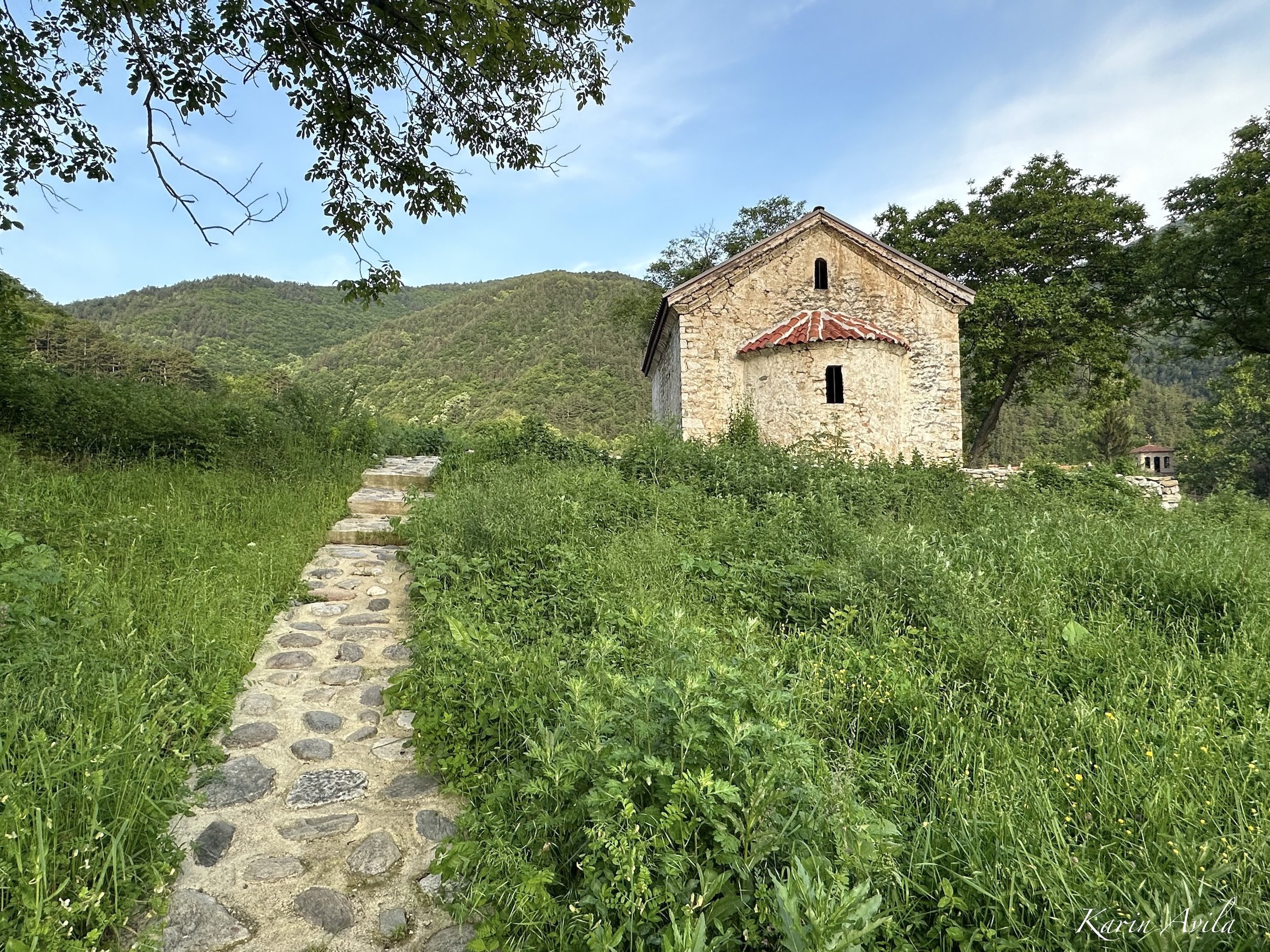Fortress of Solitude
Bachkovo, Bulgaria
The title of this post comes from my fascination with the classic Superman movies, featuring Christopher Reeve. The Fortress of Solitude is the place where he first discovers his true identity and purpose as Superman. The fortress functions as a retreat, a place removed from civilization; peaceful, beautiful, a natural wonder. It’s a place where he can reflect and consume information to help guide his purpose. For a short but enriching 18 hours, Bachkovo served as my own fortress of solitude.
Bachkovo Monastery is located 30 kilometers south of Plovdiv. Established nearly 1,000 years ago, it is the second largest monastery in Bulgaria. Given its appeal, there are several affordable transportation options. I chose to ride public transportation. Not only was this more economical, but it made for a colorful adventure.
Chepelare River on the way to Bachkovo Monastery
Neither the attendant at the bus station nor the bus driver spoke English. The one word we spoke in common was “Bachkovo.” This was enough for me to get where I wanted to go, in addition to studying Google maps and ensuring I knew the route and nearby points of interest. There is a tiny village by the same name, approximately one kilometer down the road, on the way to the monastery from Plovdiv. This was my queue to get off at the following stop, in the event I missed the large road sign. I arrived after a scenic 40-minute ride in a small shuttle bus ferrying 15 passengers.
The monastery lies in the Rhodope mountains, next to the Chepelare river. The scenery is heavily forested and spring flowers were popping everywhere. I planned to stay the night; I wanted to spend quality time at the location and absorb the spiritual atmosphere. After the shuttle dropped me off, before trapsing up to the monastery, I found a quaint riverside restaurant where I would have lunch and consume one last beer, since alcohol is strictly forbidden on the monastery grounds.
Entrance to Bachkovo Monastery
There is a micro-village at the foot of the monastery entrance, exuding a medieval feel. Multiple stalls are built adjacent to each other flank the path, each with enough room for 1-2 vendors. Items include wooden cooking utensils, colorful and intricately-designed ceramic cookware, local spices, and tea harvested from various herbs grown in the nearby mountains. There are also restaurants serving traditional fare, coffee and sweets, along the pathway.
The monastery was imposing and immaculate, with a feel dating back several centuries. Brick, wood, stone, dirt – the structures had all of the earthy trappings one would expect, including attractive curves and arches. Oddly enough, there was a small cactus garden outside the main church.
The rooms were rustic and tidy. The mattresses were seated in wooden boxed frames with down comforters and pillows, and the view from the window was nothing but mountain with grassy fields at the foot. There were chickens, peacocks, and even a vineyard on the grounds. Visitors can stroll freely and walk up the nearby hill to visit small churches and an ossuary.
One of multiple small churches on Bachkovo Monastery grounds
Given the popularity of the monastery, I was surprised to feel as if I was the only visitor that stayed the night. Once the large wooden doors at the entrance closed at 8:00PM, it was only me and the church members walking the halls of the cloister. I only saw one other visitor early the following morning who appeared to take off with intent, possibly continuing her pilgrimage. She exited shortly after dawn, filling a drinking bottle at one of the multiple spring water fountains on her way out.
Hallway to overnight rooms in the Bachkovo Monastery cloister
The highlight of my stay was the church service. Mass is held twice daily at 7:00AM then again at 6:00PM. The ritual starts with the priest circling the church twice, banging on an elongated piece of carved wood in a rhythmic pattern using a small wooden mallet. He then proceeds to the metal clapper, or long metal piece, strapped to a nearby tree and makes several clangs. The clapper is used in lieu of church bells, which were banned under the Ottoman Empire. Today, it seems this is still done as part of tradition, since the clapper was followed by a series of ringing bells from the monastery tower.
Main church inside Bachkovo Monastery cloister
Wooden piece used during call to service
Clapper used during call to service when church bells were banned
Entering the richly ornate and dark church, I was swept up in emotion. The spiritual depth of the church leaders and patrons was palpable. The aroma of Frankincense permeated the sanctuary. The priests donned long, black robes and headpieces, and they had long, gray hair and wiry beards. They stood reading from scripts on a lectern and chanting for 90 minutes. I stayed for most of that time and let the experience flow throughout my fleshy vessel. My mind and body were abuzz.
Inside Bachkovo Monastery main church
After a very comfortable night sleep, I woke up with the rising sun and chirping birds around 5:00AM. Before heading back to Plovdiv, I dawdled on the grounds for a few more hours, taking in part of the morning service. I was feeling wistful that my visit was coming to an end, knowing this might be one of those places that I only visit once in a lifetime.
Accommodation link
Overnight reservations for Bachkovo Monastery can be made online: http://www.bachkovskimanastir.com/







